- Home
- Neal Asher
Gridlinked Page 16
Gridlinked Read online
Page 16
‘I got you a present,’ she said.
Stanton took the box and let out a long slow breath. Engraved on the lid was the letter T.
‘Open it, then,’ she said, sitting up.
Even now he found it difficult. Some kind of trap inside? Trust. He pressed the catch on the side and the lid slowly lifted.
‘My God,’ he said.
Inside the box, cushioned in black velvet, were a dagger, its sheath, and a gold ring. The weapon was one casting of yellow chainglass. Inside the handle was a frame of silver wires and inside that a complexity of small cubes in which dim lights flickered. The sheath was plain black metal with two skin-stick pads.
‘It’s an early one. Twenty-third century. Its provenance is recorded in its micromind. Tenkian made it on Jocasta. It’s one of the first he made with a micromind. Limited AG,’ Jarvellis informed him.
Stanton took the weapon from the box. The grip appeared smooth, but was firm and positive. He felt a faint tingling sensation in the palm of his hand. Jarvellis went on.
‘Now it has impressed on you. Anyone else tries to handle it now, without reprogramming it, will get a brief nerve shock; enough to make them drop it.’
‘What does it do?’
‘Not much, really. You see the ring?’
Stanton took the ring from the box and inspected it. It was plain gold with a circle of green gold set concentric in its outer surface. The outer ring was octagonal, as if made to take a spanner.
‘Put it on your right index finger,’ she told him as she sat upright.
He slid the ring into place. As soon as it was there it seemed to tighten.
‘Now,’ Jarvellis continued. ‘Put the dagger back in its sheath.’
When he had done this, Jarvellis carefully took it from him, being careful only to touch the sheath. She tossed it down to the foot of the bed.
‘What now?’ he asked.
She replied, ‘The green ring turns in the gold one. Just give it a flick with your thumb.’
Stanton did as instructed. There was a sound as of a wasp shooting past. Stanton saw a flash of yellow and, before he could react, the handle of the dagger slapped into the palm of his hand. He held it there and turned to Jarvellis, a grin on his face.
‘I like it,’ he said.
Jarvellis shrugged. ‘That’s all it does, I’m afraid. It’s got just about enough intelligence not to cut your fingers off in the process.’
‘That would be quite enough in some situations,’ said Stanton. He retrieved the sheath and slid the dagger back in place. This and the box he placed on the bedside table before reaching his hand behind Jarvellis’s neck and pulling her in close. They kissed long and hard before eventually pulling apart. Stanton held up his hand and wiggled his index finger.
‘Does this mean we’re married?’ he asked.
Jarvellis stared at him seriously for a moment, then she grinned and threw herself back on the pillows. ‘Tell me again how much,’ she said.
Stanton closed his hand into a fist, a smile quirking the corners of his mouth. ‘I’ve told you once.’
‘I don’t care. I want to hear it again.’
‘All right . . . In the top layer there’s about three million left, I think. There are definitely more layers in that case, maybe five of them, I can’t be sure. I’d estimate that with the kind of armament he’s after, and with what he pays Corlackis and crew, he’ll be shelling out about five million. There’ll have to be upward of ten million left.’
‘Very nice, but how do we make it our ten million?’
‘Difficult. With Crane next to him at every moment, it doesn’t leave much room to manoeuvre. When we go after this ECS bastard he’ll have to send Crane in, and I should have my hands on some hardware by then. I’ll have to take him then, and you’ll have to come in and get me.’ Stanton stared at her, but she did not meet his look.
‘What about the other four?’
‘Well, they’ll be going in as well at some point. I’ll choose my moment. Damn, I wish I’d taken him just after he withdrew it. I was stupid.’
‘No, John, you were loyal. Why not admit to yourself that you were loyal up to a point—and that point was Mr. Crane.’ Jarvellis looked at him now and smiled. ‘You know, John, that this is the break. We pull this off and we can get an Aquarius-class upgrade. That means ram-scoop and all the speed we’ll ever need, unless ECS want to come down on us. How long do you think before we buy into a consortium and start pulling in some real wealth?’
‘Still want to buy that planet, Jarvellis?’
‘Nobody can own planets, John, but we could own enough of one not to know the difference. A planet a few centuries from the Line, well away from Polity interference. Think on that.’
Stanton reached for her and pulled her close. He loved her foolish dreams and, just so long as she stayed with him while she dreamed them, he didn’t mind. Sometimes, the thought that she might take her dreams elsewhere frightened him.
11
Cormac sat before the viewing screen in the recreation area and let out a deep sigh. He toasted Horace Blegg, then put his glass down on the table beside him. He felt very tired, but had been unable to sleep and a drink seemed the best way to unwind.
‘Ship AI . . .’ Cormac began, then paused in chagrin and started again. ‘Hubris, is this screen voice-activated?’
‘It is,’ replied one of the many voices of Hubris, this one more relaxed and easy-going because of the surroundings.
‘Give me a view into Isolation Chamber One, please.’
The screen flickered on and showed the two dracomen squatting on the floor of the chamber. They were eating slabs of recon’ protein and drinking water from tall beakers. The scene was reminiscent of something from an ancient fairy tale. Cormac winced to himself at that thought, and did not carry it any further.
‘Very efficient creatures these,’ said Hubris.
‘What do you mean?’
‘They are decontaminating themselves. They’re using some method of regeneration. There is a high level of damaged and radioactive material from their bodies in their excrement.’
‘Nice,’ said Cormac. The injection Mika had given him had hurt, and was still hurting. He wondered if she had taken some obscure form of vengeance on him by using it. There were other less painful methods of getting antactives into the bloodstream.
Hubris went on. ‘It is an extremely rapid process. They eat as much as is given them and convert it very quickly. They will be wholly regenerated within two days.’
‘And should we let them out then?’ wondered Cormac.
‘That is for you to decide. It is relevant to note that Dragon always served its own purposes, and with little regard for human life.’
Cormac nodded, more to himself than the ship AI. He remembered the two-kilometre perimeter around Dragon on Aster Colora. Dragon had said, ‘No machines inside this perimeter.’ People had tried, as people do, and that perimeter had become a ring of smashed vehicles, some still containing human remains.
Where are you, Dragon? What do you want?
Cormac turned as the door slid open behind him and Chaline walked in. She looked as tired as he felt, and obviously had the same intention in mind. She got herself a drink from the autobar, then slumped into the seat next to him. As she sipped her drink she studied him with an intensity he found unnerving. He felt compelled to talk.
‘Couldn’t sleep?’ he asked.
‘No.’ She turned away with a slight smile and rubbed at her eyes with her forefinger and thumb. ‘I was readying a probe to go into the blast-site and search out some fragments of the runcible buffer. It seems there’s a chance it was not all vaporized.’ She looked up at the screen. ‘How are our friends getting on?’
Cormac told her what Hubris had told him.
‘Dracomen . . . I had a quick look in the reference section but all I could come up with was this text called ‘The Dragon Dialogues’? It read like a philosophy thesis and ran to abou
t ten million words. Fascinating stuff, but I don’t really have the time to read it . . .’ She turned to Cormac. ‘What was this Dragon then? Not a fire-breather, I gather?’
Cormac hesitated, and then grimaced. ‘No, Dragon was the name the creature gave itself, for whatever reason . . . Hubris, do you have any film of Dragon?’
‘Enough to last a lifetime.’
‘Show us some, please.’
The screen flickered and showed a contorted rocky plain below a metallic red sky. On that plain stood four vast spheres joined in a row. Pink snow was falling.
‘There’s Dragon. Each of those spheres is a kilometre across.’
‘It was all alive?’ asked Chaline incredulously.
‘Oh yes, very much so. Xenologists thought it might once have been mobile, but when discovered it was like this. It had pseudopods rooted into the ground for kilometres all around. It must have extracted minerals or something to feed on. No one can say for sure, but later examination of the site found the ground riddled with tunnels and lacking in certain minerals found elsewhere.’
‘Later examination?’ Chaline asked.
Cormac closed his eyes as a memory, clear as day, flashed into his mind. He remembered a fantastic road made for him, two kilometres long, marked out by pseudopods five metres high and half a metre wide, each one like a white cobra, but with a single blue crystalline eye where its mouth should have been. That had been a long walk.
Chaline returned her attention to the screen again and continued before Cormac could answer. ‘It must have been made of more than flesh and bone. At that size it would have collapsed in on itself . . .’
‘Alive and a machine,’ said Cormac. ‘There were AG readings from it, and the readings of metals, and some pretty strange radiations. It’s speculated that its bones were some form of bubble metal, or that it supported itself with AG. No one got close enough to find out.’
‘Tell me more,’ said Chaline, her fatigue forgotten.
Cormac snorted and shook his head. ‘It starts with the scream, doesn’t it?’ he said, then he looked up at the screen. ‘Hubris, you might as well record this. I don’t want to have to tell it again.’ He turned his attention back to Chaline. ‘They say you scream for a fraction of a second when you’re transmitted by runcible. I didn’t arrive on Aster Colora screaming. I arrived reciting a nonsense poem. I should think you know it. Don’t we all?’
And Cormac remembered, and he told her.
(Solstan 2407)
A scream, silent in underspace: a flicker of existence between the shadows of stars. It is known, the scream, but quince never remember. For Cormac there was merely a flash of black and red, a Dante glimpse, and he was completing his thought far from where he began it.
—on mince and slices of quince, which they ate with a runcible spoon. Is that right?
Times change: terms change, and it was an ancient nonsense rhyme. He was well aware of that as he fought to overcome the disorientation of mitter-lag.
And the runcible spoon flicks them across the galaxy . . . Hah! Myths rewritten. I’m a knight in shining armour only my hardware’s on the inside.
Caught in the flaw of a jewel Cormac considered dragons. Ten seconds and 400 light-years later his mind caught up with his body. The scream was lost in a twilight place. Echoes. He stepped from the shimmer of the cusp. Down the steps from the pedestal, across the black-glass floor, then out of the containment sphere.
‘Ian Cormac?’
‘Yes.’
The sky was metallic red, the land pink rock with black striations. The horizon was more tightly curved than that viewed from the balcony of his 200th-floor apartment in New York. You noticed things like that, just as you noticed other immediacies. He sneezed, then breathed deeply. The air tasted of salt, and silica dust coated his tongue. After a moment of deliberation he turned his attention to the speaker.
‘I am Maria,’ said the girl, whose hair was red with no white light to show him different. Cormac held out his hand to silence her as his breath billowed in the chill air like lung-blood. He continued to survey the wasteland.
He gestured back at the runcible.
‘Only one. Quince and light cargo. Few people come here,’ he observed.
‘Yes, Dragon set a limit of twenty thousand visitors a year.’
‘Solstan year?’
‘No . . . Colora,’ she said, annoyed.
Cormac stared at her. ‘I require assistance, not impatience,’ he said, and waited.
‘Yes, Ambassador,’ she said grudgingly, rubbing her hand on a leather-sheathed hip. Cormac accessed his link and immediately had a report up in his visual cortex. Rather than download it into his memory, he speed-read it while he studied his surroundings.
Maria Convala. Born on Aster Colora 2376 solstan, exobiologist attached to the Earth Central study team, ambitious, has connections with the Separatist movement, is rumoured to have been involved in the third Jovian putsch . . .
He smiled bleakly to himself and thought about his other operation in this sector. Earth Central had only chosen him to come here because he knew the systems, the people, those most likely to cause trouble. Even now the agents he was running were uncovering Separatist cell after cell in that razor-walk of undercover work. As soon as the first cover was blown, the whole investigation would collapse, but a huge proportion of the Separatist network would fall with it. Of course, what was going on here was different—wasn’t it? Files blinked out and dropped away as he dismissed them as irrelevant. He allowed the smile to fade from his face and slid his attention to the iron slug of an AGC that had been left on hover nearby. He noted the rust streaks, and the plates welded to its underside. It was old. Such was always the way this far from Earth; things broke down, wore out, were infrequently replaced. He should consider himself lucky they had AGCs here at all. Was that why this sector was a hotbed of Separatism? Not enough luxuries?
‘Shall we go?’ he said, after a pause.
* * *
As they slid above the desolation, Cormac accessed information more relevant to his task. There was no life here but for the human colony, the sentient Dragon and the insentient Monitor (the latter two leviathans), nor had there been. There were no fossils, chalk deposits, or life-based hydrocarbons—nothing. Billions had been expended in deep-coring projects, sifting machines and lengthy geochemical studies. The questions remained: where was the ecology from which Dragon and Monitor had evolved? Was it on Aster Colora?
Dragon had immediately communicated with those first to arrive through the seed-ship runcible, and had been in continuous communication with the colony ever since, yet little had been learnt about it. Dragon relished oracular pronouncements and Delphic replies.
‘Has Dragon given reasons for its request?’
‘It was more of a demand than a request.’
‘Clarify that.’
With her hand resting on the guide-ball of the AGC, Maria glanced at him. ‘We have always been here on sufferance. It said, “Send me an ambassador”; there was no request.’
Cormac noted the bitterness. As a Separatist, he realized, this put her in an intolerable position. How could she campaign for political independence while Aster Colora could not rise above colony status? He wondered just how deeply in she was and how far she was prepared to go. He didn’t want to have to kill her.
The red land flowed under the rock of the AGC until at length Cartis, like a spreading fungus, came into view. Like any tourist, Cormac booked into the metrotel. In his room he slumped on his bed and accessed Dragon / human dialogue. Human politics were irrelevant in this case which, for Cormac, was a novelty.
* * *
‘You continue to evade our questions concerning yourself,’ asked a man only just holding on to his temper.
‘Yes, this is true,’ came the indifferent reply.
‘Yet for years you have had access to our information systems. You know our history, the level of our technology . . . You perhaps know more about the
human race than any single member of it. Why will you not tell us about yourself? Surely, this is little to ask?’
‘You are correct: I know more about you people than any single member of your kind.’
‘You have not answered my question.’
‘Yes, I have.’
‘I do not understand.’
‘A very human trait.’
‘Please explain.’
‘The runcible has been developed to the stage where it is near perfect in function. Humankind can now step from star system to star system with ease. On Earth, contra-terrene power is about to be introduced. In the system of Cassius the first Dyson sphere is under construction. The matter for this project came from a planet of Jovian size, demolished by a contra-terrene missile.’
‘Do you fear us?’
‘Should I?’
‘Many assume that this is the reason for your reticence.’
‘How old are you, Darson?’
‘One hundred and seventy, solstan.’
‘It is likely that you will live to be over eight hundred years old and then only to die of ennui.’
‘Perhaps. How old are you?’
‘Do you represent your race, Darson?’
‘In the sense—’
‘No, you do not represent your race. I cannot sit in judgment on you. Send me an ambassador.’
* * *
After the dialogue had ceased, Cormac opened his eyes and scratched at his head. He was tired; he had, after all, travelled a long way. He got off the bed and shed the clothes he had been wearing only a few hours earlier, personal time, in New York, and wondered, as always with cold humour, what the morning might bring. Of course he did not know whether it was day or night here, but such things he had for quite some time dismissed as irrelevant. He lived by personal time. It was the only way to stay sane.
The morning brought Maria with an analysis from Darson, the Dragon expert. Cormac read it over a breakfast of spiced eggs, honey fish and two pots of tea. Darson’s conclusion was that Dragon, in human terms, was insane. After reading it, Cormac dressed in his shabby survival suit and placed in his rucksack the single device he might need. On his way out he consigned the report to the waste disposal. Shortly he was sliding above redland, red under a bloody sky.

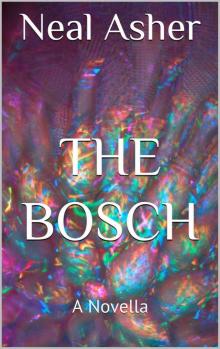 The Bosch: A Novella (Polity Universe)
The Bosch: A Novella (Polity Universe)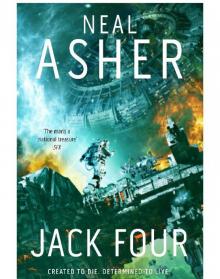 Jack Four
Jack Four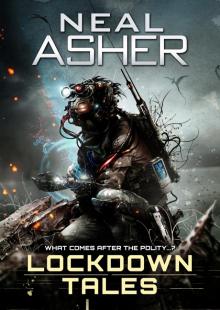 Lockdown Tales
Lockdown Tales The Warship
The Warship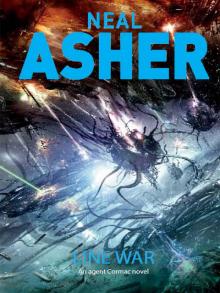 Line War
Line War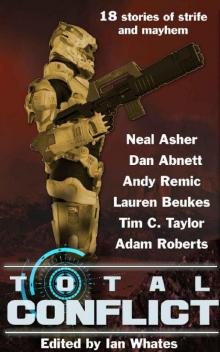 Total Conflict
Total Conflict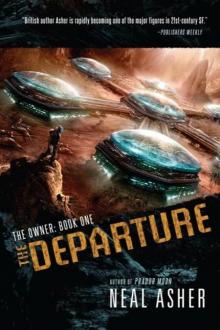 The Departure
The Departure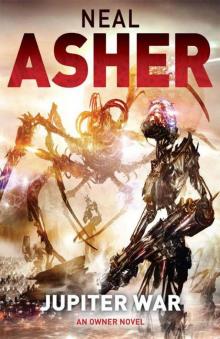 Owner 03 - Jupiter War
Owner 03 - Jupiter War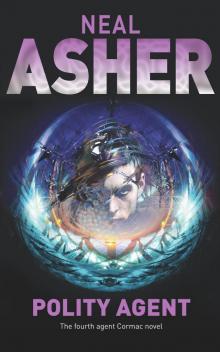 Polity Agent
Polity Agent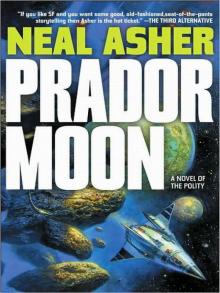 Prador Moon
Prador Moon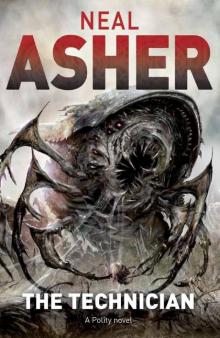 The Technician
The Technician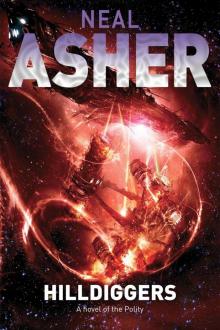 Hilldiggers
Hilldiggers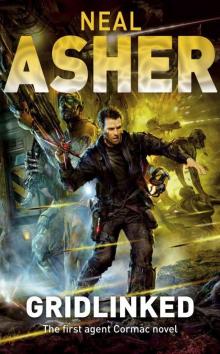 Gridlinked
Gridlinked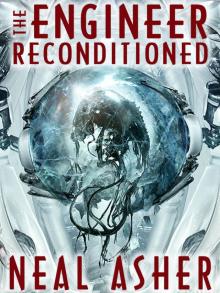 The Engineer ReConditioned
The Engineer ReConditioned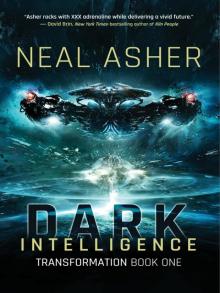 Dark Intelligence
Dark Intelligence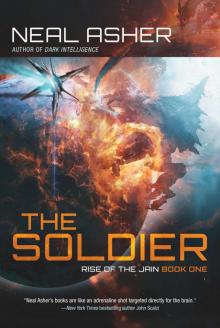 The Soldier: Rise of the Jain, Book One
The Soldier: Rise of the Jain, Book One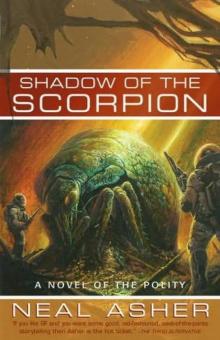 Shadow of the Scorpion p-2
Shadow of the Scorpion p-2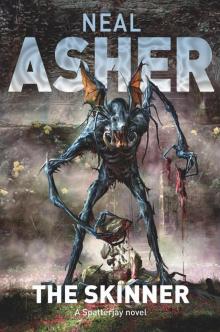 The Skinner
The Skinner The Soldier
The Soldier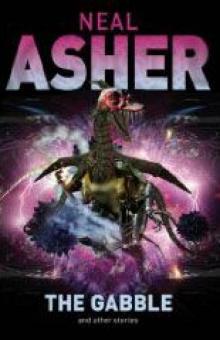 The Gabble p-13
The Gabble p-13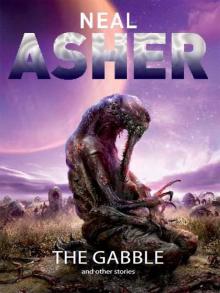 The Gabble and Other Stories
The Gabble and Other Stories The Parasite
The Parasite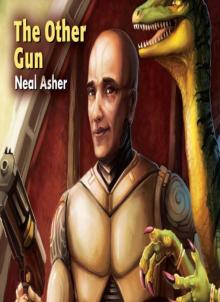 The Other Gun
The Other Gun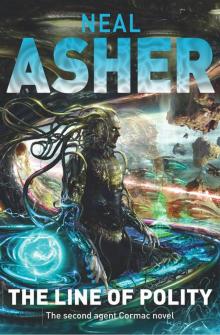 The Line of Polity
The Line of Polity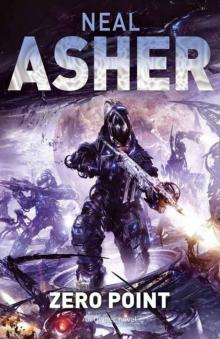 Zero Point (Owner Trilogy 2)
Zero Point (Owner Trilogy 2)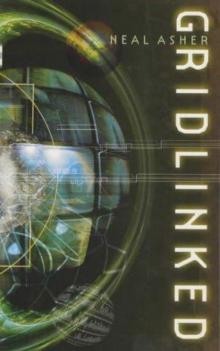 Gridlinked ac-1
Gridlinked ac-1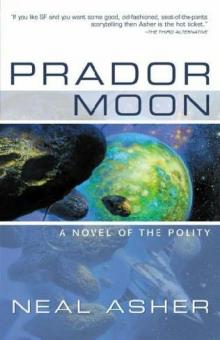 Prador Moon p-1
Prador Moon p-1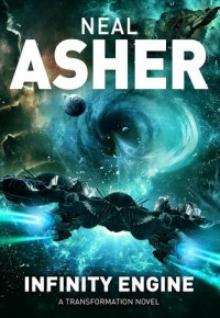 Infinity Engine
Infinity Engine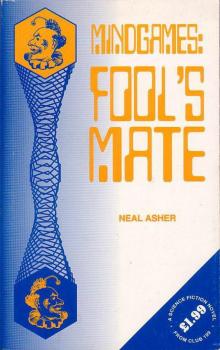 Mindgames: Fool's Mate
Mindgames: Fool's Mate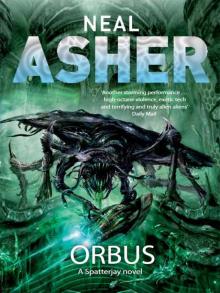 Orbus
Orbus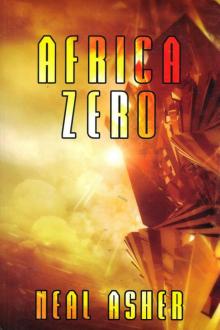 Africa Zero
Africa Zero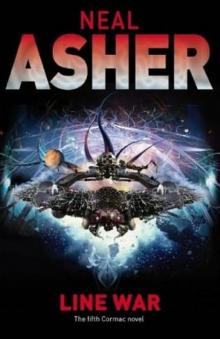 Line War ac-5
Line War ac-5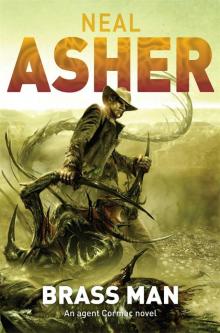 Brass Man
Brass Man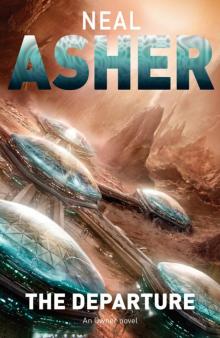 The Departure to-1
The Departure to-1 Cowl
Cowl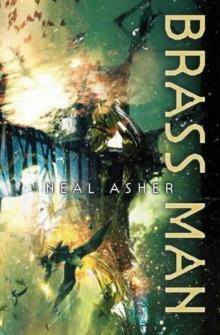 Brass Man ac-3
Brass Man ac-3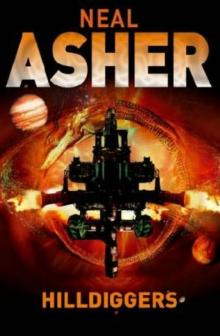 Hilldiggers (polity)
Hilldiggers (polity)![Greg Bear - [Eon Trilogy 1] - Eon (rescan) (v1.0) Read online](http://i1.bookreadfree.com/i2/04/08/greg_bear_-_eon_trilogy_1_-_eon_rescan_v1_0_preview.jpg) Greg Bear - [Eon Trilogy 1] - Eon (rescan) (v1.0)
Greg Bear - [Eon Trilogy 1] - Eon (rescan) (v1.0)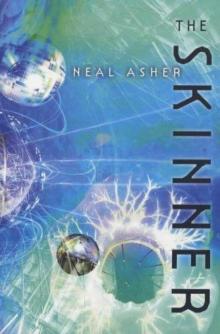 The Skinner s-1
The Skinner s-1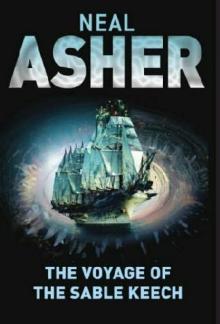 The Voyage of the Sable Keech s-2
The Voyage of the Sable Keech s-2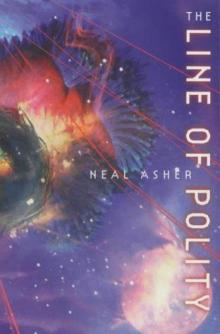 The Line of Polity ac-2
The Line of Polity ac-2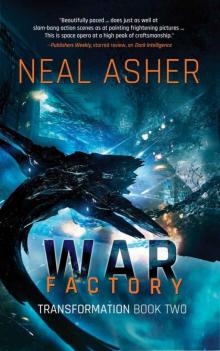 War Factory: Transformations Book Two
War Factory: Transformations Book Two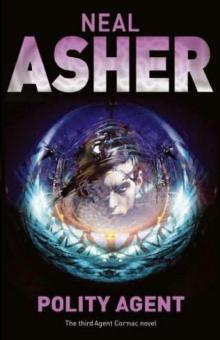 Polity Agent ac-4
Polity Agent ac-4